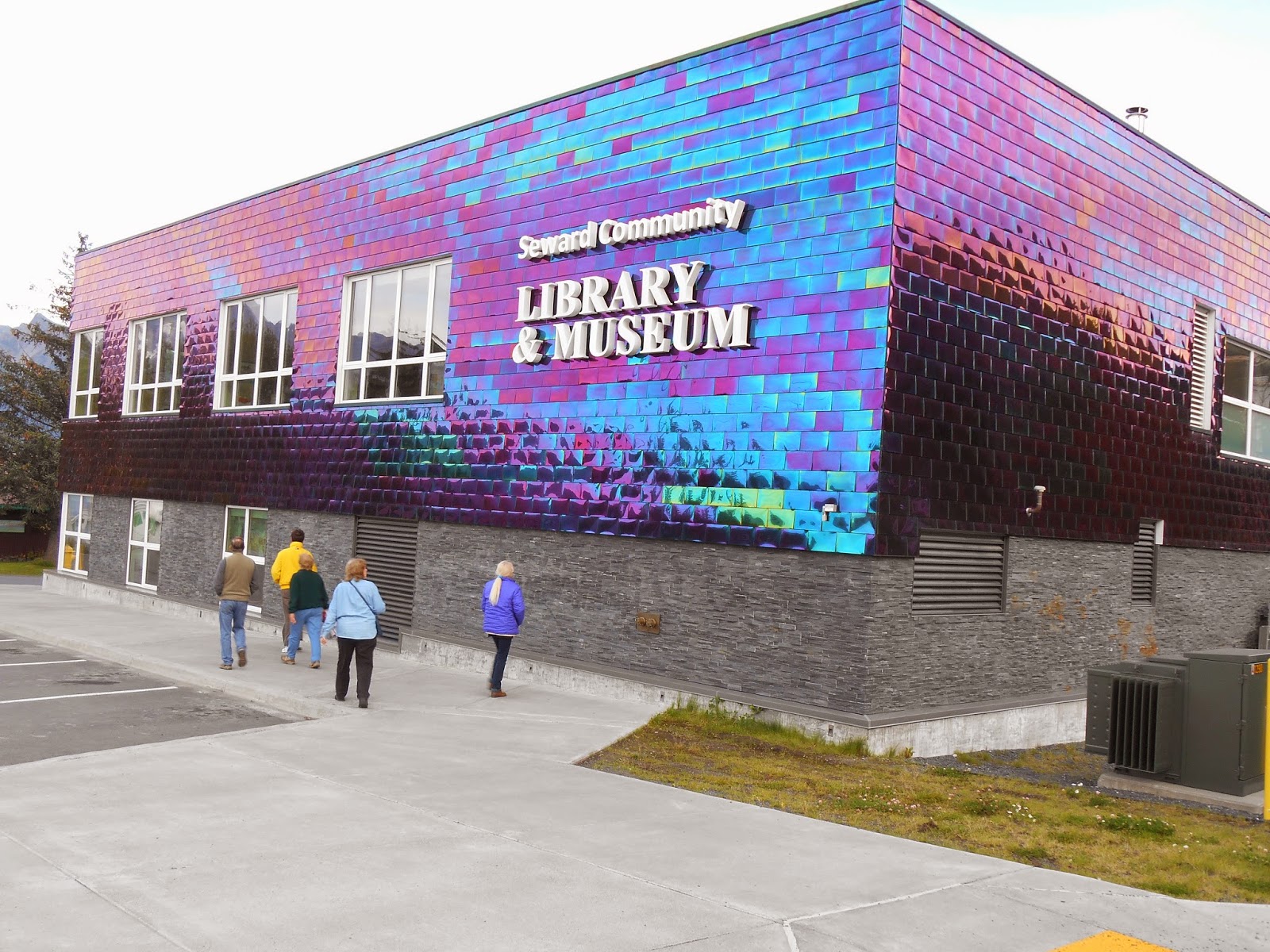 |
| Seward Boat Harbor |
We arrived in Seward around 11:30. A shuttle van was waiting at the train station to take
us to the Major Marine Office in the small boat harbor. They kindly
checked our overnight luggage and we boarded the boat for a 6 hour
Glacier/Wildlife Tour in the Kenai Fjords National Park. Nearly 40 glaciers flow from the Harding Icefield,one of four remaining icefields in the
United States and the largest icefield contained entirely within the United States. The icefield including the glaciers measures in at over 1,100 square miles. The icefield itself receives over 400 inches of snow each year. Our tour
aboard the Spirit of Adventure traveled approximately 120 miles roundtrip through
Resurrection Bay into the Kenai Fjords National Park. We continue out around Cape Aialik (pronounced “I-al-ik), into
the Aialik Bay, to view Holgate Glacier.
 |
| Is that Glacier Ice in the drinks? | | |
|
 |
| Humpback Whale! |
 |
Bird Rookery on
Chiswell Islands
in the
Resurrection Bay |
  |
“Killer whales” or Orcas
are actually quite friendly and
often
inquisitive
about humans.
This group of “resident killer whales”
feeds entirely on fish.Only “transient killer whales”
eat marine mammals.
No wild killer whale has ever hurt a human being. |
Holgate Glacier is a tidewater glacier. Glaciers form because snowfall in the high mountains exceeds snowmelt. It's a place high in the mountains that catches a vast amount of
falling snow every year. A place so high and so cold that none of
the snow melts even in the summer. Whatever precipitation that
falls over the course of the year, falls in the form of snow. Over time,
that snow pack builds. The weight of the snowflakes in the upper
layers of the snow pack presses down deforming the snowflakes beneath.
The snowflakes in the pack first change to granular snow – round ice
grains – and eventually morph into solid ice. The ice crystals form slowly under pressure and individual crystals can
grow to be the size of a football. Air trapped between the snowflakes is
also frozen into the ice at pressure. Ice near the bottom of the
glacier is under tremendous pressure, which allows it to flow almost
like plastic over the bedrock beneath. Friction between the glacier
and the bedrock produces meltwater which further lubricates the bedrock
allowing the ice to slide.
If a glacier is fed by enough snow to flow out of the mountains and down to the sea, it is called a "tidewater" glacier. As water undermines some ice fronts, great blocks of ice up to 200 feet high break loose and crash into the water.
 |
Glacial Waterfalls in
Holgate Arm,
Aialik Bay |
 |
You can see how much the
glacier has receded .
Top picture taken in 1909 .
Bottom taken in 2004. |
 |
| Holgate Glacier |
 |
It gets windier and colder the closer you
get to the glacier! |
| |
 |
Look closely and find the 2 story
cruise ships in the photo's !
Yup , that's a lot of ice! |
The perspective is very strange. Standing on the deck of the
boat it feels as if you could almost reach out and touch the glacier.
Then the captain tells you that in fact it is over a half mile away.
 |
Little Holgate Glacier, no longer a Tidal glacier as it's terminus
has receded and it no longer reaches the sea. |
 |
| Holgate Glacier is over a mile wide! |
 |
| Heading back to port after a glorious day! |
Back in Seward, we got a shuttle to the Best Western Edgewater Hotel. It is located close to downtown and after getting settled in we walked around the Waterfront Park. Many people shore fishing and the silver salmon were literally jumping out of the water teasing Mike! Checked out downtown area, the Library and the Seward Brewing Company, too! ( Well we had to go there so Terry could get a shirt for his daughter!) To bed early so we'll be rested for our kayak trip in the am!
The
metal siding on the Library is made of stainless steel and the color is added with a special
process that’s etched on to the metal which creates beautiful variations and
texture.
 And what a view from
the town playground!
And what a view from
the town playground!


















No comments:
Post a Comment